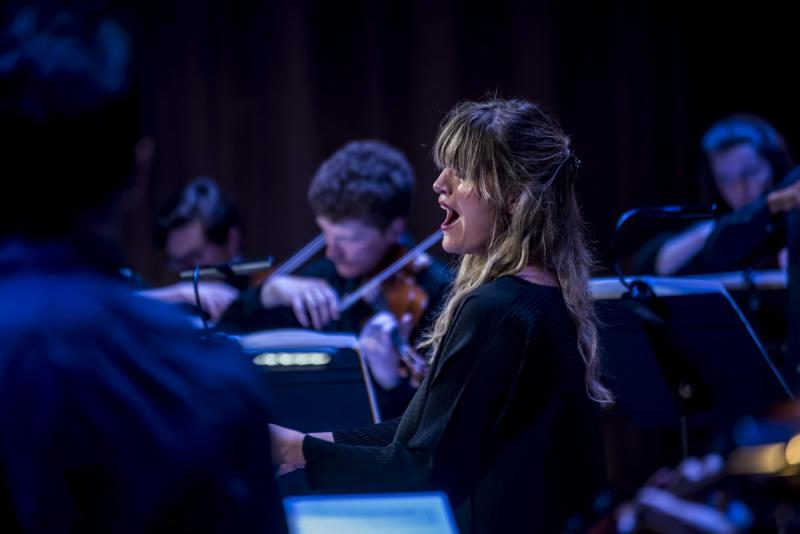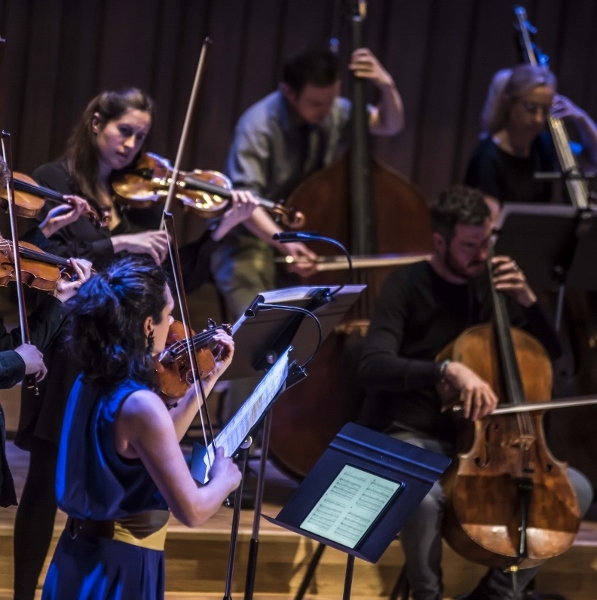Hughes, Manchester Collective, Hallé St Peter’s, Manchester review - new work and stunning singing | reviews, news & interviews
Hughes, Manchester Collective, Hallé St Peter’s, Manchester review - new work and stunning singing
Hughes, Manchester Collective, Hallé St Peter’s, Manchester review - new work and stunning singing
Edmund Finnis song cycle gets its launch with passion, anguish and consolation

Manchester Collective were back on home ground last night in the tour of a programme featuring the first performances of a new song cycle by Edmund Finnis, Out of the Dawn’s Mind. Soprano soloist was the amazing Ruby Hughes.
It was home ground for her, too, in a sense: as a former student at Chetham’s School of Music she’s an old friend of the Collective’s leader and artistic director, Rakhi Singh.
Ruby Hughes and the Collective created a moving and stimulating online streamed programme from the Lakeside Arts venue at the University of Nottingham in February last year – Dowland, Debussy, Mahler, Tavener and more besides. Now they’re together again and on the road, and this gig (the word Rakhi likes to use) at Hallé St Peter’s, the converted church in the heart of trendy, regenerated Ancoats in the city centre, concluded with a stunning performance of Britten’s Les Illuminations. They’re going to record the Britten and Finnis together in this venue in August, according to Ruby Hughes’ website.
 Nine members of the otherwise 17-strong string ensemble prefaced the singing with Olli Mustonen’s Nonet No. 2, a piece that keeps making you think you’re in the classical world (a Siciliana rhythm for the second movement, rich tonal harmonies, a moto perpetuo finale) when it’s also spiced with originality. The third movement, with Rakhi Singh’s impetus (see picture), was pure energy on steroids.
Nine members of the otherwise 17-strong string ensemble prefaced the singing with Olli Mustonen’s Nonet No. 2, a piece that keeps making you think you’re in the classical world (a Siciliana rhythm for the second movement, rich tonal harmonies, a moto perpetuo finale) when it’s also spiced with originality. The third movement, with Rakhi Singh’s impetus (see picture), was pure energy on steroids.
Out of the Dawn’s Mind is a setting of five poems by Alice Oswald. They’re not like the kaleidoscope of imagery that was to come in Britten’s settings of Rimbaud: there are tautly and logically connected strings of metaphor and conceits that demand the mind’s attention when simply seen on the page, and Finnis’s approach more than once is to ask his soloist to intone (with occasional big leaps) them over carpets of string chording. The third one is different, written in rhyming couplets, and for that he brings more measured rhythm and a sort of free recitative over it. Ruby Hughes began the cycle as if in a trance, her power dramatically varied and a sense of the mystical emerging.
The fourth, “Shadow”, is the longest and musically their emotional peak (the accompaniment developing an argument of its own at the climax), the voice more melodically inflected, and passion, anguish and consolation each wonderfully expressed by the soloist: her pianissimo at the close – “amazed” – was something to die for. The final setting makes a dying fall, as if with bated breath and gasps of vocal tone, and it ends as clashing lines melt into a unison.
Ruby Hughes has the ability to live the emotions of what she sings, while using eloquent gesture and engaging your mind by her technical finesse and precision. Her party piece began the second half: Barbara Strozzi’s song “Che si può fare” (artfully and quite romantically arranged for strings by Fred Thomas), which makes a thing of beauty out of expressions of utter misery. She delivered it with moving expertise – that’s what artistry is.
Then it was Les Illuminations. Its settings are like little multi-faceted gems, and she brought a new voice quality to every emotion: varied in power from a whisper to blistering top notes, gentle, wistful, sad and even bitter and outraged in “Parade”, and finally resigned with a quiet dignity for “Départ”. The band may have to work a bit on intonation of the upper strings in one or two spots before they do the recording, but the fact that they (almost!) held the silence at the end for a very long time before the applause broke out was testimony to the effectiveness of the whole thing.
Manchester Collective have just published their plans for 2022-23 – another season of remarkably varied programming and adventurous ideas. They’re certainly not resting on their laurels.
rating
Share this article
The future of Arts Journalism
You can stop theartsdesk.com closing!
We urgently need financing to survive. Our fundraising drive has thus far raised £49,000 but we need to reach £100,000 or we will be forced to close. Please contribute here: https://gofund.me/c3f6033d
And if you can forward this information to anyone who might assist, we’d be grateful.

Subscribe to theartsdesk.com
Thank you for continuing to read our work on theartsdesk.com. For unlimited access to every article in its entirety, including our archive of more than 15,000 pieces, we're asking for £5 per month or £40 per year. We feel it's a very good deal, and hope you do too.
To take a subscription now simply click here.
And if you're looking for that extra gift for a friend or family member, why not treat them to a theartsdesk.com gift subscription?
more Classical music
 Kaploukhii, Greenwich Chamber Orchestra, Cutts, St James's Piccadilly review - promising young pianist
A robust and assertive Beethoven concerto suggests a player to follow
Kaploukhii, Greenwich Chamber Orchestra, Cutts, St James's Piccadilly review - promising young pianist
A robust and assertive Beethoven concerto suggests a player to follow
 Robin Holloway: Music's Odyssey review - lessons in composition
Broad and idiosyncratic survey of classical music is insightful but slightly indigestible
Robin Holloway: Music's Odyssey review - lessons in composition
Broad and idiosyncratic survey of classical music is insightful but slightly indigestible
 Classical CDs: Wolf-pelts, clowns and social realism
British ballet scores, 19th century cello works and contemporary piano etudes
Classical CDs: Wolf-pelts, clowns and social realism
British ballet scores, 19th century cello works and contemporary piano etudes
 Bizet in 150th anniversary year: rich and rare French offerings from Palazzetto Bru Zane
Specialists in French romantic music unveil a treasure trove both live and on disc
Bizet in 150th anniversary year: rich and rare French offerings from Palazzetto Bru Zane
Specialists in French romantic music unveil a treasure trove both live and on disc
 Scottish Chamber Orchestra, Ibragimova, Queen’s Hall, Edinburgh review - rarities, novelties and drumrolls
A pity the SCO didn't pick a better showcase for a shining guest artist
Scottish Chamber Orchestra, Ibragimova, Queen’s Hall, Edinburgh review - rarities, novelties and drumrolls
A pity the SCO didn't pick a better showcase for a shining guest artist
 Kilsby, Parkes, Sinfonia of London, Wilson, Barbican review - string things zing and sing in expert hands
British masterpieces for strings plus other-worldly tenor and horn - and a muscular rarity
Kilsby, Parkes, Sinfonia of London, Wilson, Barbican review - string things zing and sing in expert hands
British masterpieces for strings plus other-worldly tenor and horn - and a muscular rarity
 From Historical to Hip-Hop, Classically Black Music Festival, Kings Place review - a cluster of impressive stars for the future
From quasi-Mozartian elegance to the gritty humour of a kitchen inspection
From Historical to Hip-Hop, Classically Black Music Festival, Kings Place review - a cluster of impressive stars for the future
From quasi-Mozartian elegance to the gritty humour of a kitchen inspection
 Shibe, LSO, Adès, Barbican review - gaudy and glorious new music alongside serene Sibelius
Adès’s passion makes persuasive case for the music he loves, both new and old
Shibe, LSO, Adès, Barbican review - gaudy and glorious new music alongside serene Sibelius
Adès’s passion makes persuasive case for the music he loves, both new and old
 Anja Mittermüller, Richard Fu, Wigmore Hall review - a glorious hall debut
The Austrian mezzo shines - at the age of 22
Anja Mittermüller, Richard Fu, Wigmore Hall review - a glorious hall debut
The Austrian mezzo shines - at the age of 22
 First Person: clarinettist Oliver Pashley on the new horizons of The Hermes Experiment's latest album
Compositions by members of this unusual quartet feature for the first time
First Person: clarinettist Oliver Pashley on the new horizons of The Hermes Experiment's latest album
Compositions by members of this unusual quartet feature for the first time
 Gesualdo Passione, Les Arts Florissants, Amala Dior Company, Barbican review - inspired collaboration excavates the music's humanity
At times it was like watching an anarchic religious procession
Gesualdo Passione, Les Arts Florissants, Amala Dior Company, Barbican review - inspired collaboration excavates the music's humanity
At times it was like watching an anarchic religious procession

Add comment